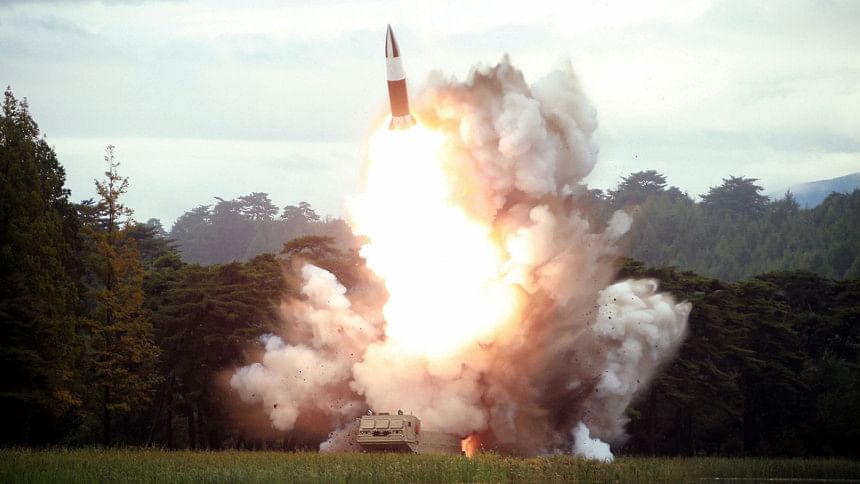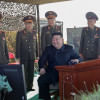NKorea's launches two short-range missiles again

North Korea fired what appeared to be two short-range ballistic missiles into the sea off its east coast today, the South Korean military said, the latest in a series of launches in recent weeks amid stalled denuclearisation talks.
-Seventh NKorean launch since Trump, Kim met in June
-US so far unsuccessful in restarting talks with NKorea
- Launch came after US-SKorea joint military drills ended
-Japan lodges protest over launches with Pyongyang: Jiji
- Launches come amid Japan-SKorea dispute over wartime labour
Today's launch was the seventh by North Korea since US President Donald Trump and North Korean leader Kim Jong Un met at the inter-Korean border in June. The launches have complicated attempts to restart talks between US and North Korean negotiators over the future of Pyongyang's nuclear weapons and ballistic missile programmes.
The two leaders agreed in June to restart working-level negotiations but the United States has so far been unsuccessful in its attempts to get the talks going again. The process has been stalled since an unsuccessful second summit between Trump and Kim in Hanoi in February.
Trump said earlier this month Kim told him he was ready to resume talks on North Korea's nuclear and missile programmes and would stop missile testing as soon as US-South Korea military exercises ended.
However, while the joint military drills are over, North Korea's continued launches caused "strong concern", South Korea's National Security Council (NSC) said today.
Trump said after the latest launches the United States has a good relationship with North Korea. "Kim Jong Un has been ... pretty straight with me," Trump told reporters at the White House.
North Korea has repeatedly criticised the mostly computer- simulated drills in recent weeks, as well as South Korea's import of high-tech weapons such as F-35 stealth jets and the US testing of its intermediate-range cruise missile as threatening and hindering dialogue.
North Korea's top diplomat called US Secretary of State Mike Pompeo a "diehard toxin" on Friday, saying: "We are ready for both dialogue and standoff."
The remarks came after US envoy on North Korea Stephen Biegun was in Seoul this week to discuss ways to get negotiations back on track.
JAPAN LODGES PROTEST
South Korea's NSC called for North Korea to stop escalating military tensions and agreed to make diplomatic efforts to bring North Korea to the negotiating table with the United States as soon as possible, South Korea's presidential office said in a statement.
A senior US administration official said: "We are aware of reports of a missile launch from North Korea and continue to monitor the situation. We are consulting closely with our Japanese and South Korean allies."
Japanese Defence Minister Takeshi Iwaya said North Korea's missile launches were a clear violation of UN resolutions and could not be ignored. He confirmed that the latest missiles fell outside Japan's Exclusive Economic Zone and posed no immediate threat to Japan's security.
Japan's Jiji news agency reported that Tokyo believed the latest projectiles launched by the North were ballistic missiles and had lodged a strong protest with Pyongyang.
South Korea's Joint Chiefs of Staff (JSC) said North Korea had fired what appeared to be short-range ballistic missiles on Saturday at around 6:45am and 7:02am KST (2145 and 2202 GMT Friday) from around Sondok in South Hamgyong province. Sondok is the site of a North Korean military airfield.
They flew about 380 km (236 miles) and reached an altitude of about 97 km (60 miles), the JSC said, the highest of all nine North Korean launches so far this year.
A US official, speaking on condition of anonymity, said the two North Korean missiles appeared to be similar to launches in recent weeks.
Japan's Coast Guard warned shipping not to approach any fallen debris.
South Korea decided to scrap an intelligence-sharing agreement with Japan this week over a long-running dispute with Tokyo about South Koreans pressed into forced wartime labour by Japan.
Asked if that affected Japan's ability to gather and analyse information about North Korea, Iwaya said: "The agreement was until November, so we want to continue cooperation with the South Korean and American militaries."
"So we'd like to make that offer to the South Korean side," he said.
South Korea's JSC said that, as the agreement with Japan had not yet expired, it would share information about the latest North Korean launch with Japan, Yonhap reported.

 For all latest news, follow The Daily Star's Google News channel.
For all latest news, follow The Daily Star's Google News channel. 









Comments